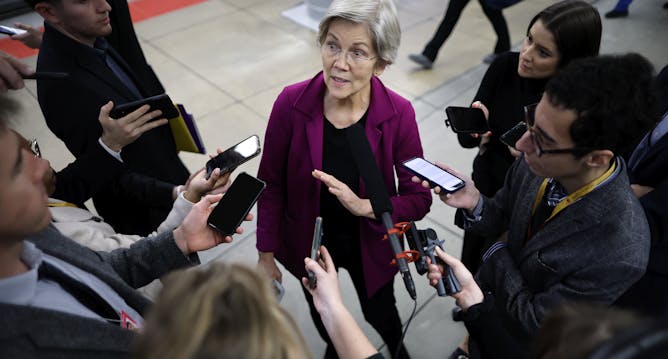|
Silicon Valley Bank’s collapse five weeks ago didn’t just spark a lot of financial volatility. It also reignited a debate over what the government needs to do to make banks more stable and less vulnerable to the kind of concerns that can make their customers freak out.
It can be hard to follow that debate if you’re not a banker. So I hope that a new article by Brian Gendreau, a University of Florida finance professor who earlier in his career worked for banks and the Federal Reserve, will help readers understand what’s on the table or soon could be. In addition to summing up many of the proposed reforms, he observes why it’s so hard to make banks less risky: “There are trade-offs between the financial stability of banks and
market discipline,” he writes.
Also today:
|

Democratic Sen. Elizabeth Warren of Massachusetts is a big proponent of banking reforms.
Chip Somodevilla/Getty Images
Brian Gendreau, University of Florida
Financial crises are inevitably followed by legislation to restructure the banking system, and the ongoing problems with bank stability are likely to be no exception.
|
Science + Technology
|
-
Joseph Stover, Gonzaga University
It’s not entirely accurate to say that you’re more likely to die in a car accident than in a plane crash. Chances are, you’re not the average person.
|
|
Politics + Society
|
-
Christopher Tounsel, University of Washington
Violence in Sudan threatens to throw the troubled nation into chaos. A scholar of the region explains what is going on and what’s at stake.
-
Thomas Doherty, Brandeis University
Can you run for president from a prison cell? One man did in the 1920 election and got almost a million votes.
|
|
Environment + Energy
|
-
Dillon Amaya, National Oceanic and Atmospheric Administration
El Niño can trigger intense and widespread periods of extreme ocean warming known as marine heat waves. They can devastate marine life.
|
|
Arts + Culture
|
-
Anita Lam, York University, Canada
Whereas ‘the camera sees everything, but captures nothing,’ courtroom artists can channel the emotional highs and lows of a trial through a single image.
|
|
Education
|
-
Toby Jenkins, University of South Carolina
Once considered a novelty in school, hip-hop has spawned an array of educational programs and initiatives that are reshaping the way educators teach and how students learn.
|
|